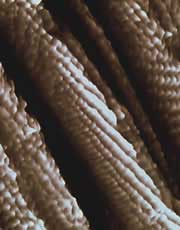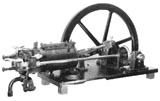
Every citizen dreams of spending less time in traffic jams, away from polluted air, while continuing to enjoy the same level of mobility and quality of life as today. On Thursday, 31 January, Commissioner for Research Philippe Busquin will participate in the conference “Towards Sustainable Urban Mobility” jointly organised by the European Commission and the European Parliament. The objective of this Conference is to present a network of ten projects in the field of land use and transport funded unde

Carbon nanotubes assemble themselves into electronic grids
Tiny electrical circuits with a single molecule for each wire have been created in the United States 1 . These grids could replace silicon chips, making computers and memory devices much more compact and powerful than they are today.
The grids comprise carbon nanotubes – long, hollow cylinders of pure carbon a few millionths of a millimetre (nanometres) across and several thousand nanometres long. Dep

Controversies over new airport runways make locals more noise-sensitive.
Public controversy surrounding the impending building of a runway may make locals much more sensitive to increased aircraft noise than planners predict. A new study warns that it could be easy to underestimate the impact of changes such as those proposed for Britain’s Heathrow Airport.
A new runway began operating at Vancouver International Airport in 1996 after highly publicized local objection to

A quantum afterburner extracts laser light from vehicle exhaust.
The hot gases belching out of your car’s exhaust are not just useless waste. They are a laser waiting to happen, says physicist Marlan Scully1.
All you need to harness this potential, suggests Scully, of Texas A&M University in College Station, is a quantum afterburner. This hypothetical modification would use quantum mechanics to boost the engine’s efficiency by clawing back waste heat and turning it

Many of today’s medicines were discovered by trial and error: a substance is found which helps alleviate the symptoms of a disease, and it may take years before scientists really understand how it works. Typically they find that a drug has its effects by attaching itself to a particular molecule in a cell and blocking part of its activity, the way you might prevent someone from turning a light on or off by putting a lock over the switch. Scientists now hope to take the opposite approach, and custom-d

Government funding puts Chinese plant biotechnology second only to US
While westerners vacillate about the risks and benefits of genetically modified (GM) crops, China is embracing the technology. A new survey shows that the Chinese are working on more plant biotechnology products than anyone outside North America1.
Chinese research institutes claim to have developed 141 GM plants, 65 of which have been approved for release into the environment. Scott Rozelle, an agricultura

Operations teams have confirmed NASA’s mission to “touch” the Sun survived its record-breaking closest approach to the solar surface on Dec. 24, 2024. Breaking its previous record by flying just…

At the Berlin synchrotron radiation source BESSY II, the largest magnetic anisotropy of a single molecule ever measured experimentally has been determined. The larger this anisotropy is, the better a…

LSU quantum researchers uncover hidden quantum behaviors within classical light, which could make quantum technologies robust. Understanding the boundary between classical and quantum physics has long been a central question…

Exploiting an ingenious combination of photochemical (i.e., light-induced) reactions and self-assembly processes, a team led by Prof. Alberto Credi of the University of Bologna has succeeded in inserting a filiform…

A team led by plant biotechnologist Prof Markus Schwarzländer from the University of Münster and biochemist Prof Bruce Morgan from Saarland University has developed new biosensors with which the ratio…

How deubiquitinases USP53 and USP54 cleave long polyubiquitin chains and how the former is linked to liver disease in children. Deubiquitinases (DUBs) are enzymes used by cells to trim protein…

Long gone are the days where all our data could fit on a two-megabyte floppy disk. In today’s information-based society, the increasing volume of information being handled demands that we…

In the search for new materials that can enable more efficient electronics, scientists are exploring so-called 2-D materials. These are sheets of just one atom thick, that may have all…

How simulations help manufacturing of modern displays. Modern materials must be recyclable and sustainable. Consumer electronics is no exception, with organic light-emitting diodes (OLEDs) taking over modern televisions and portable…

AQSolotl’s quantum controller is designed to be adaptable, scalable and cost-efficient. Quantum technology jointly developed at Nanyang Technological University, Singapore (NTU Singapore) and National University of Singapore (NUS) has now…

Pacific Northwest National Laboratory to contribute leadership to national effort in microelectronics design and development. Microelectronics run the modern world. Staying ahead of the development curve requires an investment that…

With a processing speed a billion times faster than nature, chip-based laser neuron could help advance AI tasks such as pattern recognition and sequence prediction. Researchers have developed a laser-based…